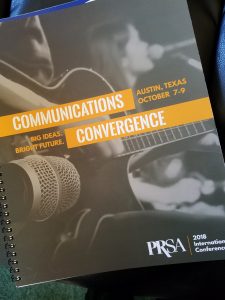
While attending PRSA’s International Conference in Austin this year, I thought how proud JJ&W’s founder, Patrick Jackson, would have been of all the conversations revolving around measuring behavioral outcomes and the PR practitioner’s role as relationship-builders and strategists… particularly at a time when our organizations, and our country, need these skills the most.
A few themes from the keynote and breakout sessions:
1. As PR Professionals, it’s our job to help organizations understand how their key audiences think – how to reach them – and motivate them to behave.
There were many sessions offering glimpses into the psychological profiles of Baby Boomers, Gen "X", Millenials/Gen "Y" and Gen "Z".Aria Finger, millennial marketing expert and founder of TMI Strategic Consulting, has engaged 6 million young people with her “DoSomething.org” website.Described as a “global movement for good,”she takes a creative approach to getting Gen Z involved in issues ranging from anti-smoking campaigns to collecting clothing for teens in need by asking them 3 simple questions:
"What are you passionate about?”
“How much time do you have?”
“What would you like to do?”
Check out their website for more examples…including the “Teens For Jeans” partnership with Aeropostle.By the way – their original outreach for “Teens for Jeans” via email registered 89 volunteers – but their text outreach garnered 3,560 responses!Know what channels work best with your target audiences.
2. PR can help drive the “Purpose Beyond Profit” movement by helping organizations identify the causes that make the most sense for their business.
In the “Digital Transformation of Communications” session, panelists discussed the fact that more than ever, CEOs and businesses are expected to lead change.Patagonia's very clear purpose of making the environment better and Starbuck's“Changing the World One Cup At A Time” campaign are two of many examples cited at the conference.Jonathan Mildenhall, marketing expert and former CMO of Airbnb, talked about the concept of “purpose driving performance”.He described how Airbnb took on the transgender discrimination issue with their “Mankind/Womankind/Trans-kind” universal belonging campaign.They used the triggering event of the ESPN ESPY Awards in 2015, when Caitlyn Jenner received the Arthur Ashe Award for courage, to launch the campaign.How has their approach impacted the bottom line, you ask?Airbnb now has 4,200,000 homes, 70 million guests and the company is valued at $31 billion.
3. PR has the skills to bring conflicting parties together and facilitate civil debate and “eloquent listening”.
The current Edelman Trust Barometer ratings show trust is at an all-time low. Keynote speakerRobert Reich, former U.S. Secretary of Labor, cites several reasons for the tumultuous, anger-filled environment we have today :
- Tribal Geography (we live — online and off– where everyone thinks like us; we need to break out of our geographic and psychological bubbles, but it’s uncomfortable so we don’t like to do it)
- Stagnant Wages: Median wages since the 70s have not changed very much and there is a general frustration that “the system is rigged against us” – thus explaining the political gravitation to more extreme political figures like Trump and Sanders, who represent a move away from “politics as usual”.
- Media Stirring The Pot. The media is good at using anger, fighting and conflict as a way of grabbing reader/viewer attention. As a society, we’ve lost the ability to listen with respect and engage in civil dialogue. Reich says PR people can have influence not over the conflict of debates but over the tone of the debate.
There is an opportunity for PR to showcase our trust and relationship-building skills…both externally (i.e. by engaging communities opposed to an issue) and internally (i.e. within our employee work groups), capitalizing on our counseling and organization development skills.
4. PR can help our organizations “break through the clutter”, by both using what we know about graphic psychology and utilizing emerging technologies. Fun fact from consultant Christopher Hannegin: 4 out of 5 Smartphone users check their device within 15 minutes of waking up in the morning. Yes…guilty here!
And if you don’t believe we live in an over-communicated world, check out www.internetlivestats.com to see how many photos have been posted to Instagram, how many tweets have been sent etc…
According to Hannegin, we need to “tell the unexpected story” and “show familiar stuff in new ways”, incorporating the use of infographics when relaying complicating earnings data for our clients, for example.Stella Low, Sr. VP of Dell, urges us to continue learning about immersive technology and to consider how “virtual reality” and “augmented reality” can be used as new tools in the PR toolbox.
5. PR is worth its weight in gold during crisis situations.
For years we have been talking about the need for the “court of public opinion” to be considered along with the “court of law” – and it is clear from the number of crisis communication presentations at conference that we have arrived at the decisionmaking table in crisis situations.Higher education consultant Joe Brennan and Eric Stern did a session on the “6 Tasks Every Leader Must Do” in a crisis and urged PR practitioners to:
- Prepare for multiple scenarios – and while you’re preparing the spokesperson, include your 2nd in command — needs backup!
- Guide leadership to speed up a traditionally slow decisionmaking cycle – your statement can’t wait in today’s 24/7 news cycle
- Define the end of the crisis; rituals help to transition (e.g. a candlelight vigil after a shooting allows people time to grieve, and then move on)
- Conduct a lessons learned review – it’s an opportunity to fix what went wrong for next time – but also, to recognize what went well.
Robin Schell, APR, Fellow PRSA is Senior Counsel and Partner at Jackson Jackson & Wagner, a behavioral public relations and management consulting firm based in the Seacoast of NH.For more information, visit www.jjwpr.com or email her at rschell@jjwpr.com.
